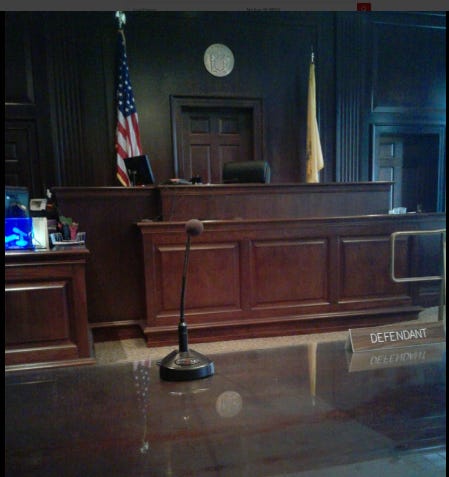BREAKING NEWS: “YOU CAN’T HAVE IT BOTH WAYS”
JUDGE HARRINGTON POINTS TO AN INCONSISTENCY IN THE DEFENDANT'S ARGUMENT
By Nick Sodano, Editor
SUMMARY: The court reconvened via Zoom on Monday afternoon for Round Two of the “Shall Mt. Holly Have a Runoff?” case before Judge Harrington. Judge Harrington gave an overview of New Jersey government forms and election history to ground the proceeding and then established relevant recent election history of Mount Holly. Both litigants made strong arguments but no judgment was rendered. However certain statements by the Judge seem to point toward a ruling in favor of the plaintiff. That said, it was sometimes difficult to determine when the Judge was making a statement expressing his own thinking [“My concern is…”] versus simply repeating the arguments of one side or the other. Recess was called at 5 pm and Judge Harrington said “an oral opinion” would be provided on Tuesday.
If you are a fan of legal proceedings, Monday's hearing was a bit of a roller coaster ride that could give either side hope of victory. However, there were points made by the Judge that seemed declarative enough to warrant repeating here and seemed to indicate that we are headed toward a runoff.
Before I provide what was said, its important for readers to have a foundation of facts established by the court about Mount Holly's election history.
· 1989 Referendum provided for staggered four-year terms. The five-person Council would have 3 members run in one election and then another election held for the other members two years later.
· 2011 Referendum moved the date of the election from May to November.
· 2013 Referendum changed from non-partisan to partisan elections.
· 2023 Referendum changed elections back to non-partisan elections.
With that understanding lets consider that Judge Harrington read from a “legislative history statement” as follows:
“…if municipalities governed by those statutes to be repealed was required to hold runoff elections, it SHALL [his emphasis] continue to hold runoffs under this bill until such time as the voters shall approve the abandonment by referendum.”
He then went on to say he didn’t believe that the 2013 Referendum could be construed as having abandoned runoffs but he also acknowledged that abandonment is clearly “what happened, OK?”. That said, since there was not an affirmative vote to abandon and we have now been returned to non-partisan election status, runoffs should be restored. “So goes the plaintiff’s analysis”.
Harrington said “You cant have it both ways”. Runoffs cant be eliminated by “operation of law” even though the law wasn’t followed with an appropriate referendum question, but then the Township comes back with the same referendum question and some words “changed around” only to maintain that the runoff now doesn’t come back.
Regarding what the voters “knew and didn’t know” based upon the wording of the Referendum, we could argue “forever”. “But clearly there was never a question posed to the residents of Mount Holly that there was going to be no more runoffs”.
What Harrington wanted to know in Monday’s proceeding was whether the Township and the County Clerk had “an affirmative obligation to explain things to the residents”. Mark Natale, representing the County Clerk, stated that a change to partisan elections HAS to include a repeal of the runoff. Because runoffs do not exist in partisan elections. The Township’s attorney Steve Raymond stated that there was no legal obligation to inform the residents that moving to partisan elections would eliminate runoffs. He went on to say that only the non-partisan election format requires an “opt out” Referendum to be voted on by residents if you want non-partisan elections without runoffs. Raymond said that explaining all this in a Referendum for partisan elections was “too much information” for everyday voters.
Judge Harrington said it could have been explained in two sentences and that obviously, people did not understand that runoffs would be eliminated, because here we are litigating it.
The judge ended by stating that on Tuesday afternoon they would delve into “statutory interpretation”. He said he was concerned about the “statutory basis for the question” in the referendum, whether it was “voidable” if it was incorrect, and what would be the remedy if it were voided.
Stay tuned for the decision late this afternoon.



